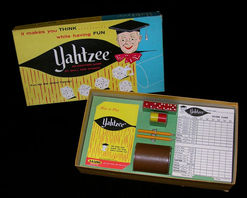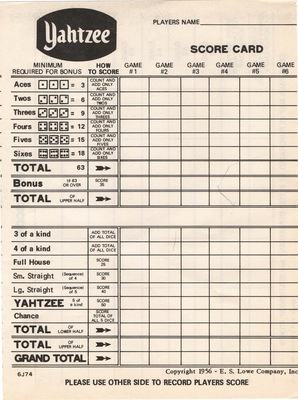Assignment 11
Due Monday 3 December at 1am
In this assignment, we will begin to implement a popular dice game called Yahtzee.™ In this game, players take turns rolling five six-sided dice. They can select which dice to re-roll, and then choose how to score the results.

The score card looks like this (enlarge):

For this first part of the assignment, we will concentrate on writing functions that will detect certain categories of rolls, and score them.
I have already given you these functions:
#include <iostream>
#include <stdlib.h>
using namespace std;
const int NUM_DICE = 5;
void rollDice(int dice[NUM_DICE])
{
for(int i = 0; i < NUM_DICE; i++) {
dice[i] = rand()%6+1;
}
}
void showDice(int dice[NUM_DICE])
{
cout << "Your dice: ";
for(int i = 0; i < NUM_DICE; i++) {
cout << dice[i] << " ";
}
cout << "\n";
}which you can call from main like this:
srand(time(NULL)); // Initialize random number generator
int dice[NUM_DICE];
rollDice(dice);
showDice(dice);Now you should implement and test the following:
// If there are three dice with the same value, return the sum
// of the values of all dice, else return zero.
int threeOfAKind(int dice[NUM_DICE]);
// If there are four dice with the same value, return the sum
// of the values of all dice, else return zero.
int fourOfAKind(int dice[NUM_DICE]);
// If there are three dice with the same value, return 50,
// else return zero.
int fiveOfAKind(int dice[NUM_DICE]);
// If there are three dice with the same value AND two dice with the
// same (but different) value, return 25, else return zero.
int fullHouse(int dice[NUM_DICE]);
// If there is a sequence of four dice (1234, 2345, or 3456), return
// 30, else return zero.
int smallStraight(int dice[NUM_DICE]);
// If there is a sequence of five dice (12345 or 23456), return 40,
// else return zero.
int largeStraight(int dice[NUM_DICE]);
// Return the sum of the dice that have the given value. So, if value
// is 4, then the sum of all dice whose value is four.
int sumOfValue(int dice[NUM_DICE], int value);To test, you may want to do a bunch of random rounds and print the results:
for(int i = 0; i < 20; i++) {
rollDice(dice);
showDice(dice);
cout << "Three of a kind: " << threeOfAKind(dice) << "\n";
cout << "Four of a kind: " << fourOfAKind(dice) << "\n";
// etc.
}But you can also test specific cases like this:
int sampleFullHouse[NUM_DICE] = { 3, 4, 3, 3, 4 };
showDice(sampleFullHouse);
cout << "Full house: " << fullHouse(sampleFullHouse) << "\n";
// should be 25